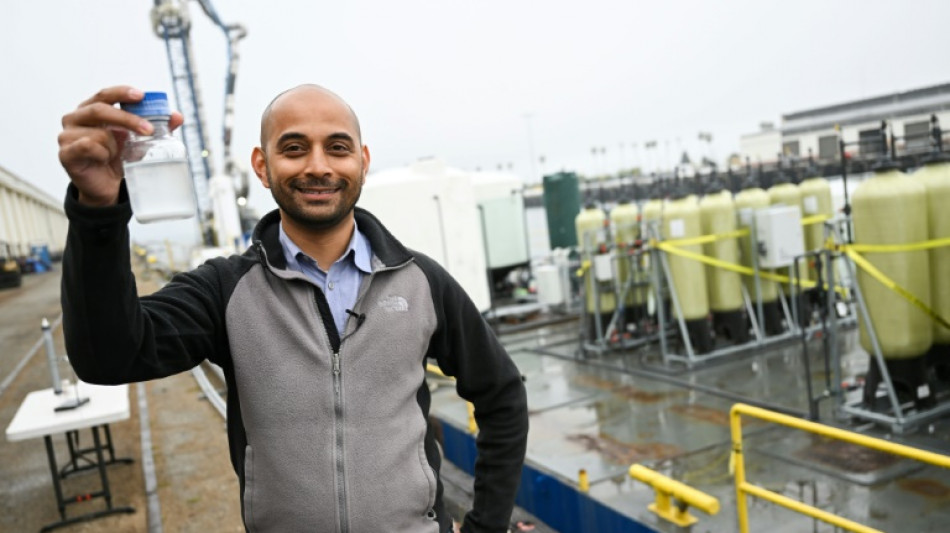
-
 Trump says US will take Greenland 'one way or the other'
Trump says US will take Greenland 'one way or the other'
-
Asian equities, precious metals surge as US Justice Dept targets Fed

-
 Myanmar pro-military party claims Suu Kyi's seat in junta-run poll
Myanmar pro-military party claims Suu Kyi's seat in junta-run poll
-
Fed chair Powell says targeted by federal probe

-
 Trailblazing Milos Raonic retires from tennis
Trailblazing Milos Raonic retires from tennis
-
Australia recalls parliament early to pass hate speech, gun laws

-
 'One Battle After Another,' 'Hamnet' triumph at Golden Globes
'One Battle After Another,' 'Hamnet' triumph at Golden Globes
-
Japan aims to dig deep-sea rare earths to reduce China dependence

-
 Top UN court to hear Rohingya genocide case against Myanmar
Top UN court to hear Rohingya genocide case against Myanmar
-
US sends more agents to Minneapolis despite furor over woman's killing

-
 Trump says Iran 'want to negotiate' after reports of hundreds killed in protests
Trump says Iran 'want to negotiate' after reports of hundreds killed in protests
-
Bangladesh's powerful Islamists prepare for elections

-
 NBA-best Thunder beat the Heat as T-Wolves edge Spurs
NBA-best Thunder beat the Heat as T-Wolves edge Spurs
-
Ukraine's Kostyuk defends 'conscious choice' to speak out about war

-
 Trump says working well with Venezuela's new leaders, open to meeting
Trump says working well with Venezuela's new leaders, open to meeting
-
Asian equities edge up, dollar slides as US Fed Reserve subpoenaed

-
 Hong Kong court hears sentencing arguments for Jimmy Lai
Hong Kong court hears sentencing arguments for Jimmy Lai
-
Powell says Federal Reserve subpoenaed by US Justice Department

-
 Chalamet, 'One Battle' among winners at Golden Globes
Chalamet, 'One Battle' among winners at Golden Globes
-
Turning point? Canada's tumultuous relationship with China

-
 Eagles stunned by depleted 49ers, Allen leads Bills fightback
Eagles stunned by depleted 49ers, Allen leads Bills fightback
-
Globes red carpet: chic black, naked dresses and a bit of politics

-
 Maduro's fall raises Venezuelans' hopes for economic bounty
Maduro's fall raises Venezuelans' hopes for economic bounty
-
Golden Globes kick off with 'One Battle' among favorites

-
 Australian Open 'underdog' Medvedev says he will be hard to beat
Australian Open 'underdog' Medvedev says he will be hard to beat
-
In-form Bencic back in top 10 for first time since having baby

-
 Swiatek insists 'everything is fine' after back-to-back defeats
Swiatek insists 'everything is fine' after back-to-back defeats
-
Wildfires spread to 15,000 hectares in Argentine Patagonia

-
 Napoli stay in touch with leaders Inter thanks to talisman McTominay
Napoli stay in touch with leaders Inter thanks to talisman McTominay
-
Meta urges Australia to change teen social media ban

-
 Venezuelans await political prisoners' release after government vow
Venezuelans await political prisoners' release after government vow
-
Lens continue winning streak, Endrick opens Lyon account in French Cup

-
 McTominay double gives Napoli precious point at Serie A leaders Inter
McTominay double gives Napoli precious point at Serie A leaders Inter
-
Trump admin sends more agents to Minneapolis despite furor over woman's killing

-
 Allen magic leads Bills past Jaguars in playoff thriller
Allen magic leads Bills past Jaguars in playoff thriller
-
Barca edge Real Madrid in thrilling Spanish Super Cup final

-
 Malinin spearheads US Olympic figure skating challenge
Malinin spearheads US Olympic figure skating challenge
-
Malinin spearheads US figure Olympic figure skating challenge

-
 Iran rights group warns of 'mass killing', govt calls counter-protests
Iran rights group warns of 'mass killing', govt calls counter-protests
-
'Fragile' Man Utd hit new low with FA Cup exit

-
 Iran rights group warns of 'mass killing' of protesters
Iran rights group warns of 'mass killing' of protesters
-
Demonstrators in London, Paris, Istanbul back Iran protests

-
 Olise sparkles as Bayern fire eight past Wolfsburg
Olise sparkles as Bayern fire eight past Wolfsburg
-
Man Utd knocked out of FA Cup by Brighton, Martinelli hits hat-trick for Arsenal

-
 Troubled Man Utd crash out of FA Cup against Brighton
Troubled Man Utd crash out of FA Cup against Brighton
-
Danish PM says Greenland showdown at 'decisive moment' after new Trump threats

-
 AC Milan snatch late draw at Fiorentina as title rivals Inter face Napoli
AC Milan snatch late draw at Fiorentina as title rivals Inter face Napoli
-
Venezuelans demand political prisoners' release, Maduro 'doing well'

-
 'Avatar: Fire and Ashe' leads in N.America for fourth week
'Avatar: Fire and Ashe' leads in N.America for fourth week
-
Bordeaux-Begles rout Northampton in Champions Cup final rematch


'Big sponge': new CO2 tech taps oceans to tackle global warming
Floating in the port of Los Angeles, a strange-looking barge covered with pipes and tanks contains a concept that scientists hope to make waves: a new way to use the ocean as a vast carbon dioxide sponge to tackle global warming.
Scientists from University of California Los Angeles (UCLA) have been working for two years on SeaChange -- an ambitious project that could one day boost the amount of CO2, a major greenhouse gas, that can be absorbed by our seas.
Their goal is "to use the ocean as a big sponge," according to Gaurav Sant, director of the university's Institute for Carbon Management (ICM).
The oceans, covering most of the Earth, are already the planet's main carbon sinks, acting as a critical buffer in the climate crisis.
They absorb a quarter of all CO2 emissions, as well as 90 percent of the warming that has occurred in recent decades due to increasing greenhouse gases.
But they are feeling the strain. The ocean is acidifying, and rising temperatures are reducing its absorption capacity.
The UCLA team wants to increase that capacity by using an electrochemical process to remove vast quantities of CO2 already in seawater -- rather like wringing out a sponge to help recover its absorptive power.
"If you can take out the carbon dioxide that is in the oceans, you're essentially renewing their capacity to take additional carbon dioxide from the atmosphere," Sant told AFP.
- Trapped -
Engineers built a floating mini-factory on a 100-foot (30-meter) long boat which pumps in seawater and subjects it to an electrical charge.
Chemical reactions triggered by electrolysis convert CO2 dissolved in the seawater into a fine white powder containing calcium carbonate -- the compound found in chalk, limestone and oyster or mussel shells.
This powder can be discarded back into the ocean, where it remains in solid form, thereby storing CO2 "very durably... over tens of thousands of years," explained Sant.
Meanwhile, the pumped water returns to the sea, ready to absorb more carbon dioxide from the atmosphere.
Sant and his team are confident the process will not damage the marine environment, although this will require further testing to confirm.
A potential additional benefit of the technology is that it creates hydrogen as a byproduct. As the so-called "green revolution" progresses, the gas could be widely used to power clean cars, trucks and planes in the future.
Of course, the priority in curbing global warming is for humans to drastically reduce current CO2 emissions -- something we are struggling to achieve.
But in parallel, most scientists say carbon dioxide capture and storage techniques can play an important role in keeping the planet livable.
Carbon dioxide removal (CDR) could help to achieve carbon neutrality by 2050 as it offsets emissions from industries which are particularly difficult to decarbonize, such as aviation, and cement and steel production.
It could help to tackle the stocks of CO2 that have been accumulating in the atmosphere for decades.
- 'Promising solution' -
Keeping global warming under control will require the removal of between 450 billion and 1.1 trillion tons of CO2 from the atmosphere by 2100, according to the first global report dedicated to the topic, released in January.
That would require the CDR sector "to grow at a rate of about 30 percent per year over the next 30 years, much like what happened with wind and solar," said one of its authors, Gregory Nemet.
UCLA's SeaChange technology "fits into a category of a promising solution that could be large enough to be climate-relevant," said Nemet, a professor at the University of Wisconsin-Madison.
By sequestering CO2 in mineral form within the ocean, it differs markedly from existing "direct air capture" (DAC) methods, which involve pumping and storing gas underground through a highly complex and expensive process.
A start-up company, Equatic, plans to scale up the UCLA technology and prove its commercial viability, by selling carbon credits to manufacturers wanting to offset their emissions.
In addition to the Los Angeles barge, a similar boat is currently being tested in Singapore.
Sant hopes data from both sites will quickly lead to the construction of far larger plants that are capable of removing "thousands of tons of carbon" each year.
"We expect to start operating these new plants in 18 to 24 months," he said.
K.AbuTaha--SF-PST



